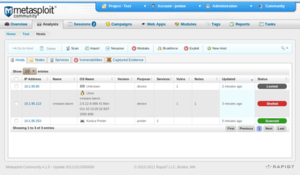Rapid7
 |
|

Metasploit Community showing three hosts, two of which were compromised by an exploit
|
|
| Developer(s) | Rapid7 LLC |
|---|---|
| Stable release |
4.14 / February 24, 2017
|
| Repository | https://github.com/rapid7/metasploit-framework, https://github.com/rapid7/metasploit-framework.git |
| Development status | Active |
| Operating system | Cross-platform |
| Type | Security |
| License | Framework: BSD, Community/Express/Pro: Proprietary |
| Website | www |
The Metasploit Project is a computer security project that provides information about security vulnerabilities and aids in penetration testing and IDS signature development.
Its best-known sub-project is the open sourceMetasploit Framework, a tool for developing and executing exploit code against a remote target machine. Other important sub-projects include the Opcode Database, shellcode archive and related research.
The Metasploit Project is well known for its anti-forensic and evasion tools, some of which are built into the Metasploit Framework.
Metasploit was created by H. D. Moore in 2003 as a portable network tool using Perl. By 2007, the Metasploit Framework had been completely rewritten in Ruby. On October 21, 2009, the Metasploit Project announced that it had been acquired by Rapid7, a security company that provides unified vulnerability management solutions.
Like comparable commercial products such as Immunity's Canvas or Core Security Technologies' Core Impact, Metasploit can be used to test the vulnerability of computer systems or to break into remote systems. Like many information security tools, Metasploit can be used for both legitimate and unauthorized activities. Since the acquisition of the Metasploit Framework, Rapid7 has added two open core proprietary editions called Metasploit Express and Metasploit Pro.
Metasploit's emerging position as the de facto exploit development framework led to the release of software vulnerability advisories often accompanied by a third party Metasploit exploit module that highlights the exploitability, risk and remediation of that particular bug. Metasploit 3.0 began to include fuzzing tools, used to discover software vulnerabilities, rather than just exploits for known bugs. This avenue can be seen with the integration of the lorcon wireless (802.11) toolset into Metasploit 3.0 in November 2006. Metasploit 4.0 was released in August 2011.
...
Wikipedia
